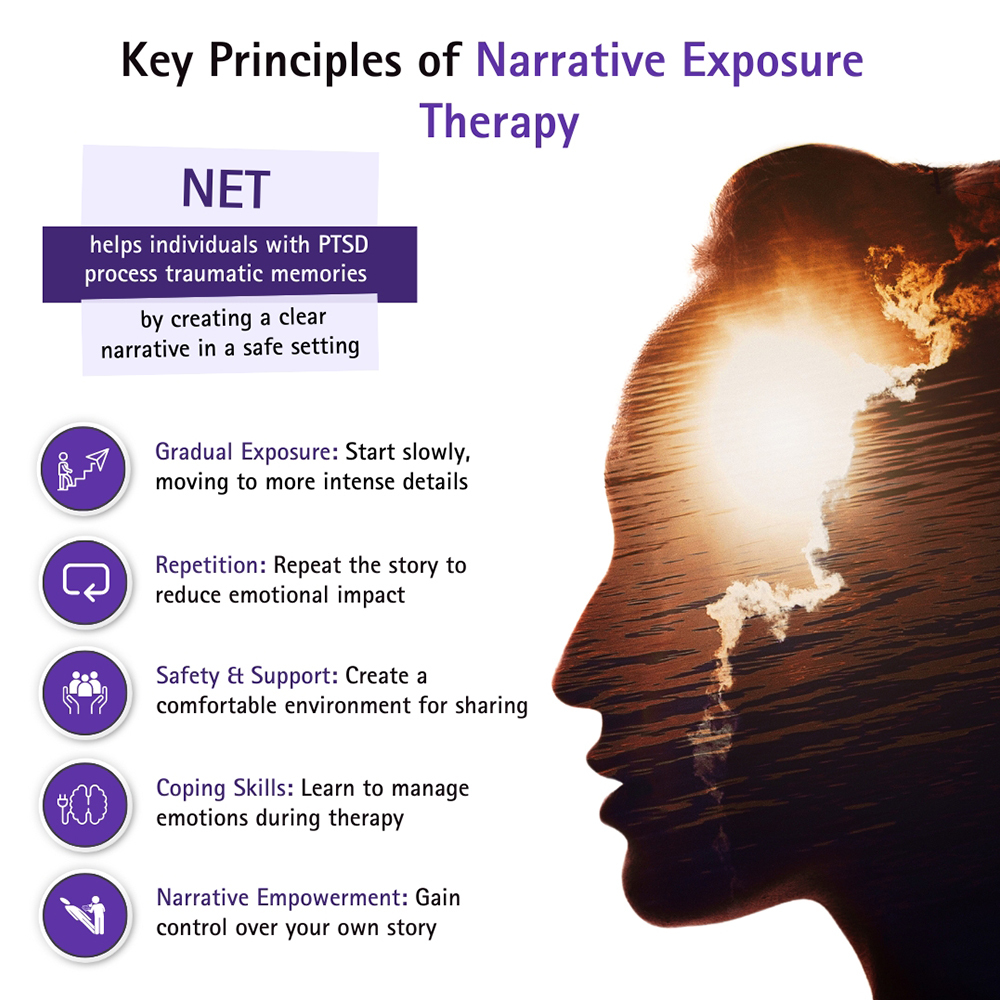
At the Trauma Therapy Center, our therapists specialize in treating trauma, which means that our team is highly trained and experienced in NET. We understand that trauma can be a life-changing experience, and we are committed to helping our clients heal and move forward. If you are interested in learning more about NET, please contact us today to discuss your needs and to see if NET is right for you.
Trauma occurs when a memory becomes integrated with a high level of energy due to a threat response. This high emotional charge makes our stressful experiences traumatic for us. During a traumatic experience, our logical consciousness is killed, and we enter an altered state. Essentially, we experience brain damage. The idea is that narrative memory is conscious. However, during a traumatic experience, we experience dissociation, and our narrative encoding goes offline due to the high levels of energy.
The purpose of NET is to help trauma survivors reintegrate traumatic memories back into narrative consciousness to decrease the energetic and emotional charge attached to the memory. All the Trauma Therapy Center NET therapists have completed a master’s degree in social work, marriage and family therapy, or mental health counseling. Our therapists then complete specialized trauma training to become proficient in NET.
What Is Narrative Exposure Therapy?
Narrative exposure therapy (NET) is a type of psychotherapy that helps people heal from intrusive symptoms of post-traumatic symptom disorder (PTSD) by retelling stories in a safe and supportive environment. Traumatic memories are fragmented and don’t have a clear beginning, middle, and end. NET helps clients create a concrete timeline of the traumatic event to help reintegrate the memory without the intense emotional connection to the memory.

What Is an Example of Narrative Therapy?
Your therapist may ask you to pick a traumatic event that is not highly distressing to begin with. Using this memory, you may be asked to create a graphic narrative consisting of 9 simple drawings. The first drawing is of the moment before anything went wrong, the middle of the worst moment, and the last drawing of the moment the fear and upset were over. After creating a clear beginning, middle, and end to a traumatic experience, your therapist may ask you to retell this story in the third person perspective.
Embrace Healing The Power of Trust in Therapeutic Relationships
“In my experience, the most effective aspect of therapy is the therapeutic relationship. Establishing trust between a client and clinician is the first step to healing.”
How Long Does Narrative Therapy Last?
The length of NET depends on the severity of your symptoms and your progress.
The phases of NET include:
- Preparation and relationship- You and your therapist will get to know each other and they will prepare you by telling you about the NET process.
- Somatic regulation– You will learn to regulate your emotions by relaxing the muscles in your body.
- Integration and desensitization- You will process traumatic memories and begin to integrate the skills you learned in therapy into your everyday life.
- Post-traumatic growth and resilience- You will consolidate the change in your perceptions of self, interpersonal relationships, and your philosophy on life.
Your therapist will continue working with you and helping you as long as you are willing. There are no limits to personal growth and your therapist will be with you to guide you throughout your process.
What Are the Goals of Narrative Therapy?
The goals of NET include:
- Externalizing the problem: Understanding that your trauma does not define you.
- Developing a new narrative: Create a new empowering narrative.
- Quality of life: Live a more fulfilling life and achieve goals.
Narrative therapy is a way to decrease the emotional charge associated with your trauma memories. NET is a gentle way to process your traumas and gain the ability to move forward from your past.
What Are Narrative Therapy Techniques?
Narrative therapy techniques include:
- Externalization: Externalization helps you see the problems in a different light. This may mean seeing the problem as a part of you, but also acknowledging all the other parts of yourself.
- Deconstruction: This technique involves breaking down large problems into smaller parts and developing problem-solving skills.
- Re-authoring: This allows you to take control of your narrative. As a result, you will begin to see yourself and your life in a more positive light.
Narrative therapy is a powerful way to change how you perceive your life experiences. At the Trauma Therapy Center, our therapists specialize in treating trauma, which means that our team is highly trained and experienced in NET to help you overcome your trauma.
Who Benefits From Narrative Therapy?
Narrative exposure therapy is an extremely effective therapy that can benefit anyone who is experiencing a problem.
Some examples of problems NET can help with include:
- Trauma
- Abuse
- Neglect
- Depression
- Anxiety
- Eating disorders
- Relationship problems
- Grief and loss
- Chronic illness
- Identity issues
- Life transitions
- Workplace stress
NET can benefit anyone who wants to improve their life, learn to challenge their perceptions, and learn problem-solving skills for complex problems.
Why Is Narrative Therapy Effective?
Narrative therapy is effective for several reasons, including:
- This form of therapy gives the client control, which means you choose how you view your situation and allows you to use this skill independently in the future.
- This therapy empowers you to see yourself differently and not as a product of your past experiences.
- You can change your negative beliefs and create a more positive perspective on yourself and your life.
NET is a powerful approach that can help you take back control of your life. Trauma Therapy Center offers a variety of NET treatment options, including individual therapy, group therapy, and family therapy.
Can Narrative Therapy Be Used for Grief?
NET is effective for grief. Grief is a natural part of life. NET helps you get through the grieving process healthily. NET can help you process your loss and find new meaning in life.
We offer a variety of therapy options to fit your needs and budget. To learn more about how much therapy costs at our center in West Palm Beach, call us at (561) 363-7994.
Narrative therapy (NET) is a highly effective trauma treatment. It can help you to heal your past, create a new narrative for your life, and build a brighter future. If you are struggling with the effects of trauma, please get in touch with the Trauma Therapy Center today to learn more about NET. We can help you heal and move forward. Contact us today to learn more about NET and to schedule a session with your therapist.

